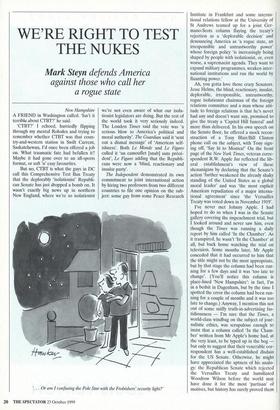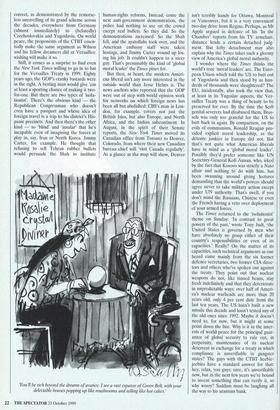WE'RE RIGHT TO TEST THE NUKES
Mark Steyn defends America against those who call her a rogue state
New Hampshire A FRIEND in Washington called. 'Isn't it terrible.about CTBT?' he said.
'CTBT?' I echoed, hurriedly flipping through my mental Rolodex and trying to remember whether CTBT was that coun- try-and-western station in Swift Current, Saskatchewan, I'd once been offered a job on. What traumatic fate had befallen it? Maybe it had gone over to an all-sports format, or soft 'n' easy favourites.
But no, CTBT is what the guys in DC call this Comprehensive Test Ban Treaty that the deplorably 'isolationist' Republi- can Senate has just dropped a bomb on. It wasn't exactly big news up in northern New England, where we're so isolationist
we're not even aware of what our isola- tionist legislators are doing. But the rest of the world took it very seriously indeed. The London Times said the vote was 'a serious blow to America's political and moral authority'. The Guardian said it 'sent out a dismal message' of 'American self- ishness'. Both Le Monde and Le Figaro called it 'un camouflet [snub] sans prece- dent', Le Figaro adding that the Republi- cans were now a 'blind, reactionary and insular party'.
The Independent demonstrated its own commitment to joint international action by hiring two professors from two different countries to file one opinion on the sub- ject: some guy from some Peace Research
. . Or am I confusing the Pole Star with the Frobishers' security light?' Institute in Frankfurt and some interna- tional relations fellow at the University of St Andrews teamed up for a joint Ger- mano-Scots column flaying the treaty's rejection as a 'deplorable decision' and denouncing America as 'a rogue state, an irresponsible and untrustworthy power' whose foreign policy 'is increasingly being shaped by people with isolationist, or, even worse, a supremacist agenda. They want to expand military programmes, weaken inter- national institutions and run the world by flaunting power.'
Ah, you gotta love those crazy Senators. Jesse Helms, the blind, reactionary, insular, deplorable, irresponsible, untrustworthy, rogue isolationist chairman of the foreign relations committee and a man whose atti- tude to foreign relations is that he's never had any and doesn't want any, promised to give the treaty a 'Capitol Hill funeral' and more than delivered. In his own speech on the Senate floor, he offered a mock recon- struction of a Tony Blair/Bill Clinton phone call on the subject, with Tony sign- ing off, 'Say hi to Monica!' On the front page of the New York Times, veteran corre- spondent R.W. Apple Jnr reflected the lib- eral establishment's view of these shenanigans by declaring that the Senate's action 'further weakened the already shaky standing of the United States as a global moral leader' and was 'the most explicit American repudiation of a major interna- tional agreement' since 'the Versailles Treaty was voted down in November 1919'.
I've never met Johnny Apple. I had hoped to do so when I was in the Senate gallery covering the impeachment trial, but I looked around and never saw him, even though the Times was running a daily report by him called 'In the Chamber'. As it transpired, he wasn't 'In the Chamber' at all, but back home watching the trial on television. Some months later, Mr Apple conceded that it had occurred to him that the title might not be the most appropriate, but by that stage the column had been run- ning for a few days and it was 'too late to change'. (You'll notice this column is place-lined 'New Hampshire': in fact, I'm in a bedsit in Dagenham, but by the time I spotted the error the column had been run- ning for a couple of months and it was too late to change.) Anyway, I mention this not out of some sniffy truth-in-advertising fas- tidiousness — I'm sure that the Times, a world-class windbag on the subject of jour- nalistic ethics, was scrupulous enough to insist that a column called 'In the Cham- ber' written from Mr Apple's home had, at the very least, to be typed up in the bog but only to suggest that their venerable cor- respondent has a well-established disdain for the US Senate. Otherwise, he might have appreciated the aptness of his analo- gy: the Republican Senate which rejected the Versailles Treaty and humiliated Woodrow Wilson before the world may have done it for the most 'partisan' of motives, but history has surely proved them
correct, as demonstrated by the remorse- less unravelling of its grand scheme across the decades, everywhere from Germany (almost immediately) to (belatedly) Czechoslovakia and Yugoslavia. On world peace, the proponents of the CTBT essen- tially make the same argument as. Wilson and his fellow dreamers did at Versailles: wishing will make it so.
Still, it comes as a surprise to find even the New York Times willing to go in to bat for the Versailles Treaty in 1999. Eighty years ago, the GOP's cranky bastards were in the right. A betting man would give 'em at least a sporting chance of making it two- for-one. But there are two types of 'isola- tionist'. There's the obvious kind — the Republican Congressman who doesn't even have a passport and whose idea of foreign travel is a trip to his district's His- panic precincts. And then there's the other kind — so 'blind' and 'insular' that he's incapable even of imagining the forces at play in, say, Iran or North Korea. Jimmy Carter, for example. He thought that refusing to sell Tehran rubber bullets would persuade the Shah to institute human-rights reforms. Instead, come the next anti-government demonstration, the police had nothing to use on the crowd except real bullets. So they did. So the demonstrations increased. So the Shah fell, and the ayatollahs took over, and the American embassy staff were taken hostage, and Jimmy Carter wound up los- ing his job. It couldn't happen to a nicer guy. That's presumably the kind of 'global moral leader' the Times pines for.
But then, at heart, the modern Ameri- can liberal isn't any more interested in the outside world than Jesse Helms is. The news anchors who reported that the GOP were out of step with world opinion work for networks on which foreign news has been all but abolished: CBS's man in Lon- don, for example, covers not just the British Isles, but also Europe, and North Africa, and the Indian subcontinent. In August, in the spirit of their Senate reports, the New York Times moved its Canadian office from Toronto to Denver, Colorado, from where their new Canadian bureau chief will 'visit Canada regularly'. As a glance at the map will show, Denver
'You'll be rich beyond the dreams of avarice. I see a vast expanse of Green Belt, with your delectable houses popping up like mushrooms and selling like hot cakes.'
isn't terribly handy for Ottawa, Montreal or Vancouver, but it is a very convenient two-day drive from Regina. Perhaps, as Mr Apple argued in defence of his 'In the Chamber' reports from his TV armchair, distance lends a certain detached judg- ment. But lofty detachment may also explain why the Times takes such a gloomy view of America's global moral authority.
I wonder where the Times thinks the world's true 'moral leaders' are. The Euro- pean Union which told the US to butt out of Yugoslavia and then stood by as hun- dreds of thousands were slaughtered? The EU, incidentally, also took the view that, at least in its Yugoslav aspects, the Ver- sailles Treaty was a thing of beauty to be preserved for ever. By the time the Serb genital-severers had disabused them, Brus- sels was only too grateful for the US to butt back in again. By comparison, on the evils of communism, Ronald Reagan pro- vided explicit moral leadership, as the détente junkies in Europe did not. But that's not quite what American liberals have in mind as a 'global moral leader'. Possibly they'd prefer someone like UN Secretary-General Kofi Annan, who, irked by the fact that Kosovo was strictly a Nato affair and nothing to do with him, has been swanning around giving lectures demanding that the world's powers should agree never to take military action except under UN authority. That's swell, if you don't mind the Russians, Chinese or even the French having a veto over deployment of your armed forces.
The Times returned to the 'isolationist' theme on Sunday: 'In contrast to great powers of the past,' wrote Tony Judt, 'the United States is governed by men who have absolutely no grasp either of their country's responsibilities or even of its capacities.' Really? On the matter of its capacities, such technical arguments as one heard came mainly from the six former defence secretaries, two former CIA direc- tors and others who've spoken out against the treaty. They point out that nuclear weapons do not, like tinned beans, stay fresh indefinitely and that they deteriorate in unpredictable ways: over half of Ameri- ca's nuclear warheads are more than 20 years old; only 4 per cent date from the last ten years. The US hasn't built a new missile this decade and hasn't tested any of the old ones since 1992. Maybe it doesn't need to, for now, but it might at some point down the line. Why is it in the inter- ests of world peace for the principal guar- antor of global security to rule out, in perpetuity, maintenance of its nuclear deterrent in exchange for a treaty in which compliance is unverifiable in gangster states? The guys with the CTBT heebie- jeebies have a standard answer for that: hey, relax, you guys; sure, it's unverifiable now, but in the next few years we're bound to invent something that can verify it, so why worry? Saddam must be laughing all the way to his uranium bank.
The US Senate understood that. Jesse Helms may have no knowledge of foreign- ers, but, to his credit, he listens to those who do. And, pace Mr Judt, the first responsibility of the men who govern the US is national security. We're on the brink of a dangerous age in which every self- respecting ramshackle dictatorship wants its own nuclear arsenal. To suggest that by for- swearing testing for ever the US will gain 'increased leverage' over the nuke wannabees is a classic left-wing delusion, as preposterous as arguing that, if the LAPD would only mothball their sidearms, the Bloods and Crips and other gangs would all turn theirs in, But Michael Douglas, the motion-picture artiste, subscribes to it.
He's the UN ambassador for peace, and last year he made an official 'anti-nuclear video' (filmed in the Canadian House of Commons) in which he looks us straight in the eye and tells us sternly, 'I said no nukes!' Heaven knows why Michael Dou- glas's views on nuclear disarmament should be of any more value than Gerhard Schroder's views on playing comedy. But, aPParently, Ambassador Douglas's thoughts are so uniquely insightful that, when he shows up in the chancelleries of the West, the most senior government ministers can't get enough of him. Like Sharon Stone in Basic Instinct, prime ministers and foreign secretaries uncross their legs and give him a come-hither look. Unfortunately, the West- ern strategy of cosying up to celebrity peacenilcs seems not to have impressed those hatchet-faced Stalinists in P'yongyang. raced with Michael Douglas barking 'I said no nukes!', they merely scoff and order up another couple of dozen warheads with You really sucked in Fatal Attraction' paint- ed on the side. In such a world, Jesse Helms seems to have a shrewder understanding of his nation's interest than the starry-eyed Internationalists.
So Britain and Europe should consider themselves lucky. Thanks to the Senate, the US reserves the theoretical right to take its nuclear umbrella out of the closet every now and then without waiting for that rainy day to discover it no longer works. Fortunately for all of us, unlike monarchies such as Britain, where the prime minister has inherited the vast pow- ers of the Crown, and faux republics such as France, where the president is a latter- day king, the presidency of the United States is a weak and constrained institu-
tion. John Maynard Keynes called Woodrow Wilson 'a blind and deaf Don Quixote' who was 'bamboozled' by the
Europeans. These days, the real isolation- ists, blind and deaf to the realities of the world, are the treaty enthusiasts outraged at the way the Senate declined to subscribe to the sappy Left's fetishisation of this doc- ument. The Senate refused to compromise the US national interest, and all credit to them. CTBT may or may not be a country station in Swift Current, but, either way, it's not playing our song.




















































































 Previous page
Previous page